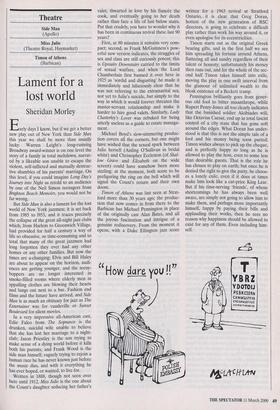Theatre
Side Man (Apollo) Miss Julie (Theatre Royal, Haymarket) Timon of Athens (Barbican)
Lament for a lost world
Sheridan Morley
any days I know, but if we get a better new play out of New York than Side Man this year we shall be more than usually lucky. Warren Leight's long-running Broadway award-winner is on one level the story of a family in total meltdown, narrat- ed by a likeable son unable to escape the violent, self-inflicted and mutually destruc- tive shambles of his parents' marriage. On this level, if you could imagine Long Day's Journey into Night as retold to an audience by one of the Neil Simon teenagers from Brighton Beach Memoirs, you would not be far wrong. But Side Man is also a lament for the lost world of New York jazzmen; it is set back from 1985 to 1953, and it traces precisely the collapse of the great all-night jazz clubs which, from Harlem to Greenwich Village, had provided for half a century a way of life so obsessive, so time-consuming and so total that many of the great jazzmen had long forgotten they ever had any other homes or any other families. But now the times are a-changing; Elvis and Bill Haley are about to appear on the horizon, audi- ences are getting younger, and the teeny- boppers arc no longer interested in smoke-filled rooms where elderly men in appalling clothes are blowing their hearts and lungs out next to a bar. Fashion and films and the future have arrived, and Side Man is as much an obituary for jazz as The Entertainer was for vaudeville or Sunset Boulevard for silent movies.
In a very impressive all-American cast, Edie Falco from The Sopranos is the drunken, suicidal wife unable to believe that she has lost her marriage to a night- club; Jason Priestley is the son trying to make sense of a dying world before it kills both his parents, and Frank Wood is the side man himself, vaguely trying to rejoin a human race he has never known just before the music dies, and with it everything he has ever hoped, or wanted, to live for. Written in 1888, though not seen over here until 1912, Miss Julie is the one about the Count's daughter seducing her father's valet, thwarted in love by his fiancée the cook, and eventually going to her death rather than face a life of lust below stairs. Put that crudely, you have to wonder why it has been in continuous revival these last 90 years?
First, at 80 minutes it remains very com- pact; second; as Frank McGuinness's pow- erful new version indicates, the struggles of sex and class are still curiously potent; this is Upstairs Downstairs carried to the limits of sexual warfare, and when the Lord Chamberlain first banned it over here in 1925 as 'sordid and disgusting' he made it immediately and hilariously clear that he was not referring to the extramarital sex, nor yet to Julie's suicide, but simply to the way in which it would forever threaten the master-servant relationship and make it harder to hire good valets. Similarly, Lady Chatterley's Lover was rebuked for being utterly useless as a guide to estate manage- ment.
Michael Boyd's slow-simmering produc- tion covers all the corners, but one might have wished that the sexual spark between Julie herself (Aisling O'Sullivan in bridal white) and Christopher Eccleston (of Shal- low Grave and Elizabeth on the wide screen) could have somehow been more sizzling; at the moment, both seem to be prefiguring the ring on the bell which will signal the Count's return and their own doom.
Timon of Athens was last seen at Strat- ford more than 30 years ago; the produc- tion that now comes in from there to the Barbican has Michael Pennington in place of the originally cast Alan Bates, and all the joyous fascination and intrigue of a genuine rediscovery. From the moment it opens, with a Duke Ellington jazz score written for a 1963 revival at Stratford Ontario, it is clear that Greg Doran, hottest of the new generation of RSC directors, is going to celebrate a difficult play rather than work his way around it, or even apologise for its eccentricities.
Timon starts out as the original Greek bearing gifts, and in the first half we see him spreading his fortune around Athens, flattering all and sundry regardless of their talent or honesty; unfortunately his money then runs out, and for the whole of the sec- ond half Timon takes himself into exile, moving the play in one swift interval from the glamour of unlimited wealth to the bleak existence of a Beckett tramp.
Pennington brilliantly goes from gener- ous old fool to bitter misanthrope, while Rupert Penry-Jones all too clearly indicates that the banished soldier Alcibiades will, like Octavius Caesar, end up in total fascist control of a city state that has gone soft around the edges. What Doran has under- stood is that this is not the simple tale of a fool and his money being soon parted; Timon wishes always to pick up the cheque, and is perfectly happy so long as he is allowed to play the host, even to some less than desirable guests. That is the role he has chosen to play on earth; but once he is denied the right to give the party, he choos- es a lonely exile, even if it does at times make him look like a cut-price King Lear. But if his time-serving 'friends', of whose shortcomings he has always been well aware, are simply not going to allow him to make them, and perhaps more importantly himself, happy by paying their bills and applauding their works, then he sees no reason why happiness should be allowed to exist for any of them. Even including him- self.


































































 Previous page
Previous page